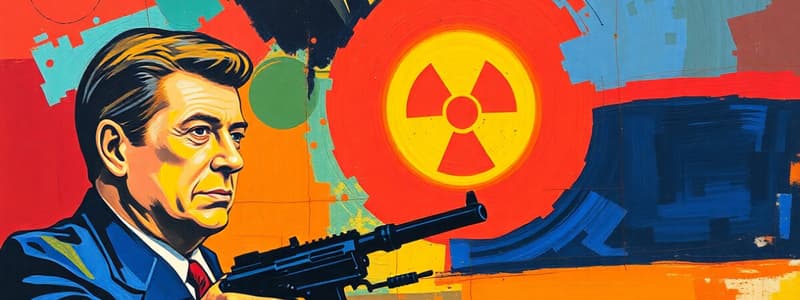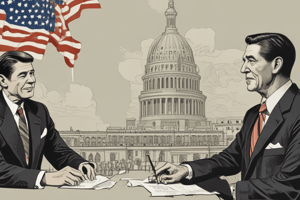Podcast
Questions and Answers
What was a major criticism of Reagan's Strategic Defense Initiative (SDI)?
What was a major criticism of Reagan's Strategic Defense Initiative (SDI)?
- It was too similar to existing missile defense systems.
- It aimed to improve relations with foreign nations.
- It was supported by military leaders without opposition.
- It proposed technology that was not yet developed. (correct)
How did public opinion manifest in response to Reagan's nuclear policies?
How did public opinion manifest in response to Reagan's nuclear policies?
- Public interest in nuclear disarmament decreased sharply.
- There were significant protests, including a large rally in NYC. (correct)
- Most Americans believed that nuclear arms race fears were unfounded.
- The media strongly supported all of Reagan's proposals.
What event revealed the tensions within the U.S. government regarding Reagan's policies?
What event revealed the tensions within the U.S. government regarding Reagan's policies?
- The public's overwhelming support for military funding.
- The establishment of the Strategic Defense Initiative.
- The successful negotiation of arms reduction with the Soviet Union.
- The Iran-Contra scandal. (correct)
What was one of Reagan's significant foreign policy achievements?
What was one of Reagan's significant foreign policy achievements?
What was the societal impact of the fear regarding Reagan's nuclear policies?
What was the societal impact of the fear regarding Reagan's nuclear policies?
What were the primary objectives of Gorbachev's reforms?
What were the primary objectives of Gorbachev's reforms?
What significant meetings took place between Reagan and Gorbachev during the mid-1980s?
What significant meetings took place between Reagan and Gorbachev during the mid-1980s?
What was one of the key outcomes of the relationship between Reagan and Gorbachev?
What was one of the key outcomes of the relationship between Reagan and Gorbachev?
Which principle did Gorbachev advocate through his reforms?
Which principle did Gorbachev advocate through his reforms?
What was the main reason for the Soviet Union's need for reforms by the late 1980s?
What was the main reason for the Soviet Union's need for reforms by the late 1980s?
What was the primary reason President Bush decided not to continue fighting into Baghdad during the Gulf War?
What was the primary reason President Bush decided not to continue fighting into Baghdad during the Gulf War?
Which technological advancement significantly impacted the perception of the Gulf War among Americans?
Which technological advancement significantly impacted the perception of the Gulf War among Americans?
What was the outcome of the Gulf War concerning the Iraqi army after ground combat began?
What was the outcome of the Gulf War concerning the Iraqi army after ground combat began?
What was President Bush's approval rating reported after the Gulf War, according to a Gallup Poll?
What was President Bush's approval rating reported after the Gulf War, according to a Gallup Poll?
Which operation marked the beginning of U.S. military preparation for intervention in Kuwait?
Which operation marked the beginning of U.S. military preparation for intervention in Kuwait?
What was a key feature of the Bush Doctrine implemented during Bush's presidency?
What was a key feature of the Bush Doctrine implemented during Bush's presidency?
Which group was responsible for the 1993 bombing of the World Trade Center?
Which group was responsible for the 1993 bombing of the World Trade Center?
What term did journalist Dexter Filkins use to describe the ongoing military engagements initiated under the Bush Doctrine?
What term did journalist Dexter Filkins use to describe the ongoing military engagements initiated under the Bush Doctrine?
How did the geopolitical landscape change as a result of the conflicts initiated by the Bush administration?
How did the geopolitical landscape change as a result of the conflicts initiated by the Bush administration?
What was the implication of al-Qaeda's sheltering by the Taliban in Afghanistan?
What was the implication of al-Qaeda's sheltering by the Taliban in Afghanistan?
What was one of the main reasons John Kerry criticized President Bush during the 2004 Election?
What was one of the main reasons John Kerry criticized President Bush during the 2004 Election?
What became notorious about the treatments at Guantanamo Bay, also known as 'Gitmo'?
What became notorious about the treatments at Guantanamo Bay, also known as 'Gitmo'?
Which statement accurately reflects the context of the Abu Ghraib scandal?
Which statement accurately reflects the context of the Abu Ghraib scandal?
What strategy did President Bush employ to counter criticism of the War on Terror during his campaign?
What strategy did President Bush employ to counter criticism of the War on Terror during his campaign?
How did John Kerry's past vote on the war impact his candidacy?
How did John Kerry's past vote on the war impact his candidacy?
What was a significant feature of the Affordable Care Act regarding pre-existing conditions?
What was a significant feature of the Affordable Care Act regarding pre-existing conditions?
How did the Affordable Care Act aim to support individuals without health insurance?
How did the Affordable Care Act aim to support individuals without health insurance?
What immediate requirement was imposed on all Americans under the Affordable Care Act?
What immediate requirement was imposed on all Americans under the Affordable Care Act?
Which of the following statements regarding the number of uninsured Americans post-Affordable Care Act is accurate?
Which of the following statements regarding the number of uninsured Americans post-Affordable Care Act is accurate?
What was one of the conservative criticisms related to the healthcare reforms introduced by Obama?
What was one of the conservative criticisms related to the healthcare reforms introduced by Obama?
What primary issue did hourly workers face during the outbreak regarding sick leave?
What primary issue did hourly workers face during the outbreak regarding sick leave?
Which factor compounded the challenges of controlling the virus during the outbreak?
Which factor compounded the challenges of controlling the virus during the outbreak?
How did the politicization of mask-wearing affect public health efforts during the outbreak?
How did the politicization of mask-wearing affect public health efforts during the outbreak?
What misconception did some political figures have regarding the pandemic's impact on the presidential election?
What misconception did some political figures have regarding the pandemic's impact on the presidential election?
What has been a significant consequence of the continued infections and deaths from new Covid-19 variants?
What has been a significant consequence of the continued infections and deaths from new Covid-19 variants?
Flashcards are hidden until you start studying
Study Notes
Reagan and Nuclear Weapons
- Ronald Reagan’s policy on nuclear weapons was controversial, with plans for the Strategic Defense Initiative (SDI) or "Star Wars" being met with protests and criticism.
- SDI aimed to create a space-based system using lasers to shoot down incoming Soviet missiles, a technology that did not exist at the time.
- Public fear of Reagan reigniting a nuclear arms race led to a massive protest in NYC in 1982, with over a million people participating.
- Congress opposed Reagan's policies, leading to the Iran-Contra scandal.
- Despite the controversy, Reagan’s efforts to reduce tensions with the Soviet Union and negotiate arms reduction are considered significant achievements.
The Fall of the Soviet Empire
- The Soviet Empire began to collapse in the late 1980s due to internal pressure and economic issues.
- Mikhail Gorbachev, a believer in socialism, recognized the Soviet Union's dire need for reform.
- Perestroika, aimed at restructuring the Soviet economy, and Glasnost, promoting openness and government transparency, initiated a shift towards less economic control and greater freedom of speech.
- Gorbachev and US President Ronald Reagan met in 1985 in Geneva, Switzerland, and again in 1986 in Reykjavik, Iceland.
- Their relationship facilitated unprecedented cooperation during the Cold War, leading to arms reduction agreements.
The Gulf War
- Iraq invaded Kuwait in 1990, sparking US intervention.
- Operation Desert Shield was initiated in August 1990, laying the groundwork for intervention.
- Operation Desert Storm began in January 1991, marked by the rapid victory of the US-led coalition.
- New technologies like laser-guided precision bombing were used, making the war widely viewable through 24-hour coverage on CNN.
- The Iraqi army crumbled within 100 hours of ground combat.
- The US chose not to advance into Baghdad to avoid occupation and potential insurgency, reflecting the lingering impact of the Vietnam War.
- President Bush received high public approval, reaching 89% in a Gallup Poll, due to the swift victory.
The September 11 Attacks and Aftermath
- The 9/11 attacks were carried out by al-Qaeda, a radical Islamic militant group led by Osama bin Laden.
- The Taliban government of Afghanistan provided shelter to al-Qaeda.
- Al-Qaeda had a history of attacks against the United States, including the 1993 World Trade Center bombing and attacks on U.S. embassies and military bases.
- The Bush administration implemented the Bush Doctrine, which allowed for preemptive war against threats to the United States.
- The Bush Doctrine led to prolonged conflicts in Afghanistan and Iraq, significantly expanding U.S. involvement in global affairs.
- Journalist Dexter Filkins described the post-9/11 landscape as a "Forever War," characterized by a perpetual struggle against an elusive enemy.
- The September 11 attacks fundamentally altered the geopolitical landscape of the 21st century.
Bush's War on Terror
- Bush faced criticism over the handling of the War on Terror.
- John Kerry, the Democratic nominee, critiqued the failure to contain the insurgency in Iraq, find weapons of mass destruction, and capture Osama bin Laden.
- The Abu Ghraib prison scandal, where American soldiers abused prisoners, further damaged public opinion.
- Enemy combatants captured were detained at Guantanamo Bay, Cuba.
- The prison became notorious for harsh treatment, indefinite detention, and alleged torture of prisoners.
- Bush defended his policies by urging Americans to "Support our troops," and won the 2004 election.
- Kerry, who had initially voted to authorize the war, struggled to gain support.
The Affordable Care Act
- The Affordable Care Act (ACA) was a major legislative achievement of President Barack Obama, aiming to expand health insurance coverage in the United States.
- The ACA was inspired by earlier attempts at national healthcare reform, dating back to President Theodore Roosevelt.
- The ACA's key features included:
- Eliminating pre-existing conditions as a basis for denying coverage.
- Eliminating "junk plans" – plans that offered limited benefits, often with high deductibles.
- Establishing state-run health insurance exchanges, allowing individuals without health insurance to pool their purchasing power and access plans.
- Providing states with funds to expand Medicaid eligibility.
- Requiring all Americans to provide proof of health insurance coverage, with penalties for those who did not comply.
- Offering federal subsidies to those who could not afford insurance.
- Despite its passage, the number of uninsured Americans remained high, and critics pointed to the continued existence of high healthcare costs.
- The ACA's provisions drew criticism from conservatives, who argued that the law increased government involvement in healthcare and imposed overly burdensome regulations.
US Response to COVID-19 Outbreak
- States implemented varied responses, creating a fragmented approach to managing the pandemic.
- Competition for personal protective equipment (PPE) exacerbated the situation.
- Hourly workers faced a difficult choice between earning a paycheck and staying home if sick, due to the lack of paid sick leave.
- The use of masks became a political issue, hindering containment efforts.
- Emergence of new variants and vaccine hesitancy further complicated the pandemic's control.
- Some Republican figures alleged that the pandemic was a political ploy to benefit then-candidate Joe Biden.
- The development and rollout of vaccines provided hope, but vaccine hesitancy slowed the progress of controlling the virus.
- New variants continued to emerge, leading to a sustained number of infections and deaths, particularly among vulnerable groups.
- The pandemic tragically resulted in over 1 million American deaths by 2024.
Studying That Suits You
Use AI to generate personalized quizzes and flashcards to suit your learning preferences.




